Elisabeth Boehm
Elisaveta Merkuryevna Bem or Boehm or Böhm (Russian: Елизавета Меркурьевна Бём; 1843–1914)[1][2] was a Russian painter, a popular designer of postcards.[3][4]
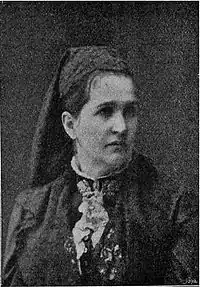
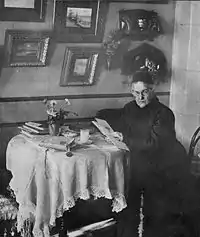
Biography
She was born in Saint Petersburg to a noble Russian family of Endaurov (Эндауров) that had a Tatar origin. She spent her childhood in the estate of her parents: village Schiptsy, Poshekhonsky uezd, Yaroslavl Governorate. At the age of 14 she entered the School of Painting at the Society for Promotion of Artists (Школа Поощрения Художеств) there she studied under Ivan Kramskoi and Pavel Chistyakov.[5] In 1865 she graduated from the school with the Large Silver Medal.[6] She took private lessons from Kramskoi and studied at the Imperial Academy of Arts there she was awarded a Large Encouragement Medal for her animal paintings.[6]
She married a prominent Russian-Hungarian violinist Ludwig Boehm, professor of the Saint Petersburg Conservatory.[5] Elisabeth painted many watercolors, illustrated children books of the Folk Library (Народная библиотека) series there she was introduced by Leo Tolstoy. She also experimented with glass and ceramics. For her Silhouettes, Etchings and works of glass she received medals of the World Fairs in Chicago of 1893, Paris of 1900, Munich of 1902 and Milan of 1906 (gold medal).[5]
Still she is mostly known as one of the most prominent Russian authors of postcards. She created more than 350 postcards.[7] Most of her postcards were printed by the St. Eugenia Welfare Society (Благотоворительное Общество Святой Евгении). She created a recognisable style of postcards, that depict children's faces and silhouettes. According to the study of Tretyakov and Gutterman she was the most reprinted author of postcards in the Russian empire.[4]
Elisabeth Böhm died in 1914.[5]
Selected postcards
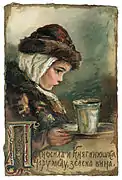 The princess brought mead
The princess brought mead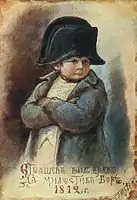 The Enemy was terrible but
The Enemy was terrible but
God is merciful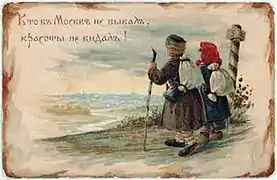 One who has not been to Moscow has not seen beauty
One who has not been to Moscow has not seen beauty People stand for different things but I stand for my friend
People stand for different things but I stand for my friend
References
| Wikimedia Commons has media related to Elizaveta Boehm. |
- "Зимняя Диана Елизавета Бем". www.peoples.ru.
- "Бем Елизавета Меркурьевна - Биография". www.biografija.ru.
- Лети с приветом, вернись с ответом Archived 2008-05-25 at the Wayback Machine "Антиквариат, предметы искусства и коллекционирования" № 1, 2002
- ВОЗМОЖНОСТИ ИСПОЛЬЗОВАНИЯ ОТКРЫТОК ДЛЯ АНАЛИЗА НЕКОТОРЫХ ЯВЛЕНИЙ ОБЫДЕННОГО СОЗНАНИЯ РОССИЯН С 1900 ПО 1917 ГОД Archived 2004-08-17 at the Wayback Machine by V. P. Tretyakov and A. A. Guterman "Клио" N 2 (14) за 2001 г.
- ЕЛИЗАВЕТА МЕРКУРЬЕВНА БЁМ. ЖИЗНЬ И ТВОРЧЕСТВО by T.A.Kasyanenko (in Russian)
- "Бем Елизавета Меркульевна". www.rulex.ru.
- "В Биробиджане откроется выставка старинной русской открытки". www.tatar-inform.ru.